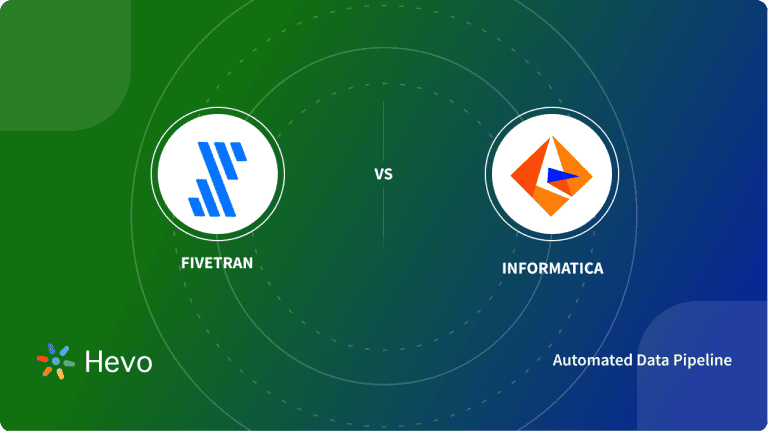The digital age has brought about an explosion in data generation, creating the need for efficient tools to process and integrate vast amounts of information. ETL solutions are pivotal in this context, enabling organizations to extract, transform, and load information from various sources into unified systems for analysis and decision-making. Among the leaders in this domain is Informatica, a platform known for its comprehensive capabilities in managing data pipelines.
However, as the business arena changes, many companies seek alternatives to better align with their unique requirements. This article highlights several notable Informatica competitors. The blog also explains why organizations might consider them over Informatica.
Why Explore Alternatives to Informatica for Data Integration?
Informatica’s reputation as a powerful ETL tool is well-earned, but it isn’t a one-size-fits-all solution. For some organizations, the cost of implementing and maintaining Informatica may be prohibitive, especially for small to mid-sized businesses. Budget constraints often prompt these companies to explore competitors that offer similar functionalities at a more accessible price point.
Scalability is another critical factor driving the search for alternatives. While Informatica offers robust features, certain businesses may find other platforms more adept at handling their specific workloads, especially in cloud-first environments. For instance, cloud-native ETL tools often provide better compatibility with modern infrastructures, allowing seamless integration with platforms like Snowflake, Google BigQuery, or Amazon Redshift.
Additionally, some businesses may prefer Informatica alternatives open-source for cost-effective and customizable solutions. These give them the benefits of avoiding vendor lock-in along with greater flexibility in modifying their data pipelines. Moreover, user-friendliness plays a significant role. Businesses that lack extensive technical expertise may benefit from Informatica alternatives open-source tools that emphasize simplicity and offer no-code or low-code interfaces. These solutions enable quicker implementation and reduce dependency on specialized developers, making integration more accessible to non-technical teams.
Finally, the rise of hybrid and cloud-focused ecosystems has shifted the priorities of many organizations. Modern ETL solutions are increasingly expected to offer real-time processing, flexibility, and support for diverse information sources. While Informatica excels in many areas, competitors like AWS Glue and Matillion offer features that specifically cater to these emerging needs.
Top Informatica Competitors
Hevo Data
Hevo Data is a no-code data pipeline platform designed for simplicity and speed. Businesses seeking an intuitive solution for integrating information from multiple sources often turn to Hevo for its ease of use. This platform supports over 150 integrations, ranging from SaaS applications to databases, making it highly versatile for organizations with diverse ecosystems.
Hevo Data’s real-time capabilities are a standout feature, ensuring businesses can make timely decisions based on the most recent information. It also automates schema mapping, significantly reducing the time and effort required to set up pipelines. For many, Hevo Data serves as a valuable alternative to Informatica. For those looking for even more flexibility, such an open-source Informatica alternative can be a great option to explore, thus offering greater customization and cost-saving potential.
Read more : 6 Benefits of Having a Primary Care Doctor
Microsoft Azure Data Factory
Microsoft Azure Data Factory is an ideal choice for enterprises that are heavily invested in the Microsoft ecosystem. As a cloud-based integration service, it provides seamless connectivity between on-premises and cloud environments. This hybrid functionality makes it particularly useful for businesses transitioning to the cloud but still reliant on legacy systems.
One of Azure Data Factory’s most appealing aspects is its integration with other Microsoft services, such as Power BI, Azure Synapse Analytics, and SQL Server. This interoperability allows organizations to build comprehensive analytics solutions without juggling disparate tools. Additionally, its ability to orchestrate complex workflows makes it suitable for large-scale operations requiring advanced customization.
Matillion
Matillion has earned its reputation as a cloud-native ETL platform modified for modern data warehouses. Businesses using platforms like Snowflake, Google BigQuery, or Amazon Redshift often find Matillion’s compatibility unmatched. Its cloud-first approach ensures that organizations can leverage the scalability and flexibility of modern infrastructures without compromise.
Matillion’s visual interface simplifies building and managing workflows, making it accessible to both technical and non-technical users. Its pricing model is another highlight, offering pay-as-you-go options that align with cloud computing’s consumption-based nature. For businesses prioritizing cost-efficiency and cloud optimization, Matillion is a strong contender in the ETL space.
AWS Glue
AWS Glue, Amazon Web Services’ fully managed ETL service, is made for organizations seeking automation and efficiency in their data integration processes. Its serverless architecture eliminates the need for infrastructure management, allowing businesses to focus solely on their workflows. AWS Glue excels in automation, with features like schema discovery and job scheduling that streamline the ETL process. It also generates code automatically, reducing the need for manual scripting. For organizations already utilizing AWS ecosystems, Glue offers seamless integration with services like Amazon S3, Redshift, and Athena, making it a natural fit for cloud-first strategies. Its pay-as-you-go pricing further enhances its appeal, ensuring affordability without sacrificing functionality.
To compare these platforms effectively, consider the following unique advantages offered by each competitor:
- Hevo Data: Real-time processing, no-code interface, and extensive integrations
- Microsoft Azure Data Factory: Hybrid compatibility and deep integration with Microsoft services
- Matillion: Cloud-native design and flexibility along with consumption-based pricing
- AWS Glue: Serverless architecture and automation-centric features
Conclusion
Informatica remains a keystone in the ETL terrain, trusted by organizations worldwide for its robust capabilities. However, as data integration needs to diversify, alternatives like Hevo Data, Microsoft Azure Data Factory, Matillion, and AWS Glue offer compelling reasons to explore new options. Various Informatica competitors bring unique strengths, catering to specific business requirements such as cost-efficiency, cloud compatibility, or ease of use. By evaluating these alternatives, organizations can ensure that their chosen ETL solution aligns with their goals and enhances their ability to derive value from data.
